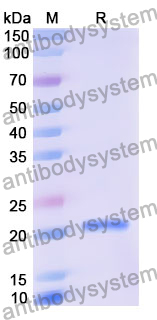Catalog No.
YHN31901
Expression system
E. coli
Species
Homo sapiens (Human)
Protein length
Arg170-Asp338
Predicted molecular weight
21.53 kDa
Nature
Recombinant
Endotoxin level
Please contact with the lab for this information.
Purity
>90% as determined by SDS-PAGE.
Accession
Q99712
Applications
ELISA, Immunogen, SDS-PAGE, WB, Bioactivity testing in progress
Form
Lyophilized
Storage buffer
Lyophilized from a solution in PBS pH 7.4, 0.02% NLS, 1mM EDTA, 4% Trehalose, 1% Mannitol.
Reconstitution
Reconstitute in sterile water for a stock solution. A copy of datasheet will be provided with the products, please refer to it for details.
Shipping
In general, proteins are provided as lyophilized powder/frozen liquid. They are shipped out with dry ice/blue ice unless customers require otherwise.
Stability and Storage
Use a manual defrost freezer and avoid repeated freeze thaw cycles. Store at 2 to 8°C for frequent use. Store at -20 to -80°C for twelve months from the date of receipt.
Alternative Names
ATP-sensitive inward rectifier potassium channel 15, KCNJ15, Inward rectifier K(+) channel Kir1.3, Potassium channel, inwardly rectifying subfamily J member 15, KCNJ14, Inward rectifier K(+) channel Kir4.2
The physiological characteristics of inward rectifying potassium channel Kir4.2 and its research progress in human diseases., PMID:40342929
Prader-Willi syndrome gene expression profiling of obese and non-obese patients reveals transcriptional changes in CLEC4D and ANXA3., PMID:40105403
Kir5.1 regulates Kir4.2 expression and is a key component of the 50-pS inwardly rectifying potassium channel in basolateral membrane of mouse proximal tubules., PMID:39745541
KCNJ15 inhibits chemical-induced lung carcinogenesis and progression through GNB1 mediated Hippo pathway., PMID:39725264
The Identification of Goat KCNJ15 Gene Copy Number Variation and Its Association with Growth Traits., PMID:38397239
The dynamics of the electrotactic reaction of mouse 3T3 fibroblasts., PMID:38092134
Epigenomics Analysis of the Suppression Role of SIRT1 via H3K9 Deacetylation in Preadipocyte Differentiation., PMID:37511041
Screening and validation of potential markers associated with uterine corpus endometrial carcinoma and polycystic ovary syndrome based on bioinformatics methods., PMID:37363398
KCNJ15 deficiency promotes drug resistance via affecting the function of lysosomes., PMID:37274925
Identification and validation of molecular subtype and prognostic signature for lung adenocarcinoma based on neutrophil extracellular traps., PMID:37143472
Integrative Analyses Identify KCNJ15 as a Candidate Gene in Patients with Epilepsy., PMID:36168094
Transcriptome analysis of peripheral blood mononuclear cells in patients with type 1 diabetes mellitus., PMID:35976509
Inwardly rectifying potassium channels mediate polymyxin-induced nephrotoxicity., PMID:35570209
Histone acetylome-wide associations in immune cells from individuals with active Mycobacterium tuberculosis infection., PMID:35102304
RNA-Seq Analysis Reveals Dendrobium officinale Polysaccharides Inhibit Precancerous Lesions of Gastric Cancer through PER3 and AQP4., PMID:34721627
Kcnj16 (Kir5.1) Gene Ablation Causes Subfertility and Increases the Prevalence of Morphologically Abnormal Spermatozoa., PMID:34205849
Defects in KCNJ16 Cause a Novel Tubulopathy with Hypokalemia, Salt Wasting, Disturbed Acid-Base Homeostasis, and Sensorineural Deafness., PMID:33811157
Hunting for Familial Parkinson's Disease Mutations in the Post Genome Era., PMID:33802862
Host gene expression modulated by Zika virus infection of human-293 cells., PMID:33059318
The Genetics of Alzheimer's Disease in the Chinese Population., PMID:32235595
ASO Author Reflections: KCNJ15 Expression and Malignant Behavior of Esophageal Squamous Cell Carcinoma., PMID:32166595
KCNJ15 Expression and Malignant Behavior of Esophageal Squamous Cell Carcinoma., PMID:32052303
Defective bicarbonate reabsorption in Kir4.2 potassium channel deficient mice impairs acid-base balance and ammonia excretion., PMID:31870500
Loss of KCNJ15 expression promotes malignant phenotypes and correlates with poor prognosis in renal carcinoma., PMID:30799948
Identification of genetic risk factors in the Chinese population implicates a role of immune system in Alzheimer's disease pathogenesis., PMID:29432188
Effect of heat stress on the gene expression of ion transporters/channels in the uterus of laying hens during eggshell formation., PMID:29115887
Concerted action of KCNJ15/Kir4.2 and intracellular polyamines in sensing physiological electric fields for galvanotaxis., PMID:26983902
Involvement of Potassium and Cation Channels in Hippocampal Abnormalities of Embryonic Ts65Dn and Tc1 Trisomic Mice., PMID:26501103
KCNJ15/Kir4.2 couples with polyamines to sense weak extracellular electric fields in galvanotaxis., PMID:26449415
Potassium channel KCNJ15 is required for histamine-stimulated gastric acid secretion., PMID:26108660
RNA-seq-based transcriptome profiling reveals differential gene expression in the lungs of Sprague-Dawley rats during early-phase acute hypobaric hypoxia., PMID:26050109
Diagnostic value of blood gene expression signatures in active tuberculosis in Thais: a pilot study., PMID:25764116
Replication study for the association of a single-nucleotide polymorphism, rs3746876, within KCNJ15, with susceptibility to type 2 diabetes in a Japanese population., PMID:23595124
Identification of novel genes selectively expressed in the follicle-associated epithelium from the meta-analysis of transcriptomics data from multiple mouse cell and tissue populations., PMID:22991451
Inherited β-cell dysfunction in lean individuals with type 2 diabetes., PMID:22723272
Inhibition of glucose-stimulated insulin secretion by KCNJ15, a newly identified susceptibility gene for type 2 diabetes., PMID:22566534
Acid secretion-associated translocation of KCNJ15 in gastric parietal cells., PMID:21719736
Mutations at KCNQ1 and an unknown locus cause long QT syndrome in a large Australian family: implications for genetic testing., PMID:20186784
Identification of KCNJ15 as a susceptibility gene in Asian patients with type 2 diabetes mellitus., PMID:20085713
Differential gene expression profiles of normal human parotid and submandibular glands., PMID:18826381
Strong bias in the location of functional promoter polymorphisms., PMID:16086313
A high proportion of chromosome 21 promoter polymorphisms influence transcriptional activity., PMID:15200235
Developmentally regulated expression of the murine ortholog of the potassium channel KIR4.2 (KCNJ15)., PMID:10906485
A hyperprostaglandin E syndrome mutation in Kir1.1 (renal outer medullary potassium) channels reveals a crucial residue for channel function in Kir1.3 channels., PMID:9727001
Identification of regions that regulate the expression and activity of G protein-gated inward rectifier K+ channels in Xenopus oocytes., PMID:9379410
A new inward rectifier potassium channel gene (KCNJ15) localized on chromosome 21 in the Down syndrome chromosome region 1 (DCR1)., PMID:9299242
Cloning and characterization of two K+ inward rectifier (Kir) 1.1 potassium channel homologs from human kidney (Kir1.2 and Kir1.3)., PMID:8995301

